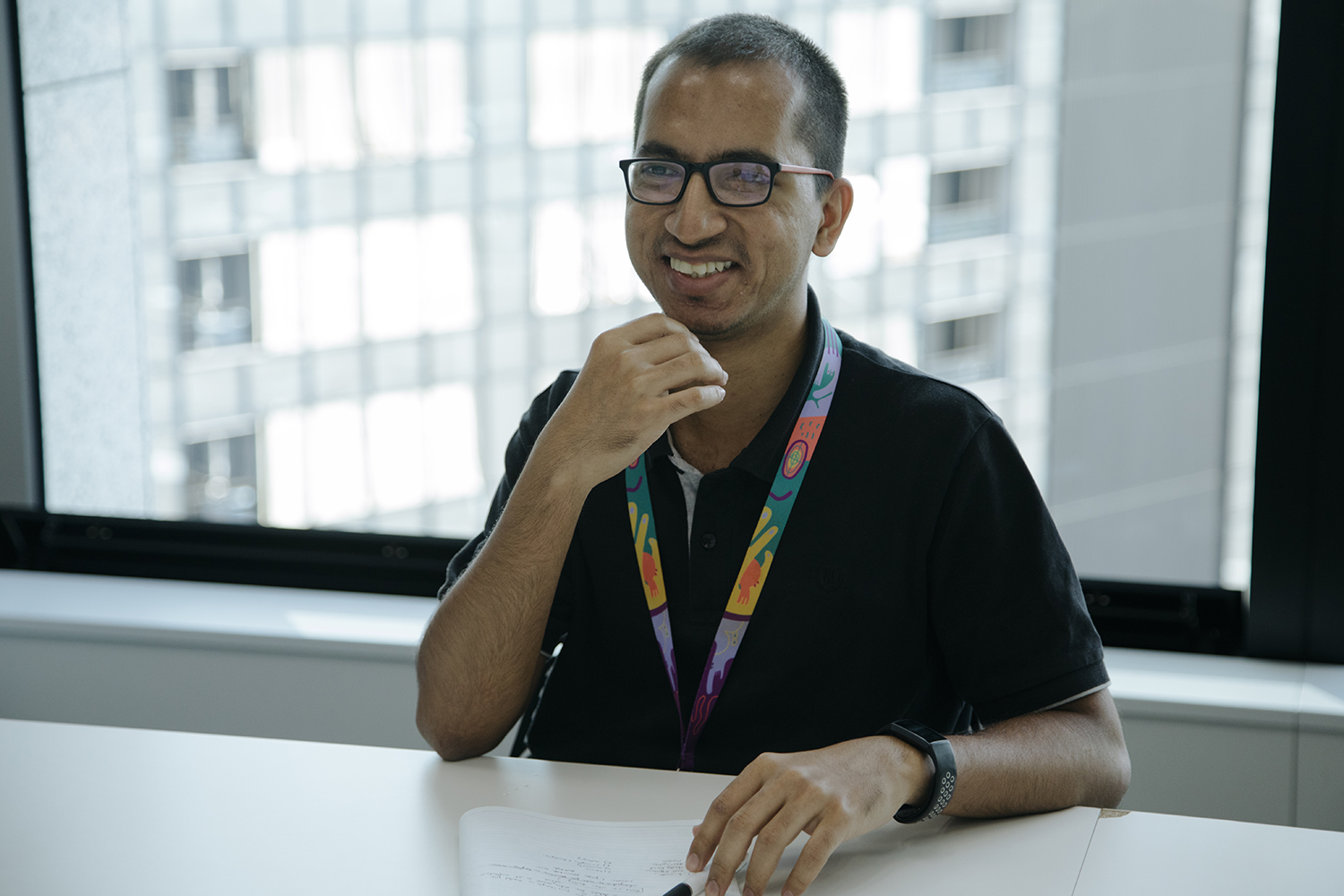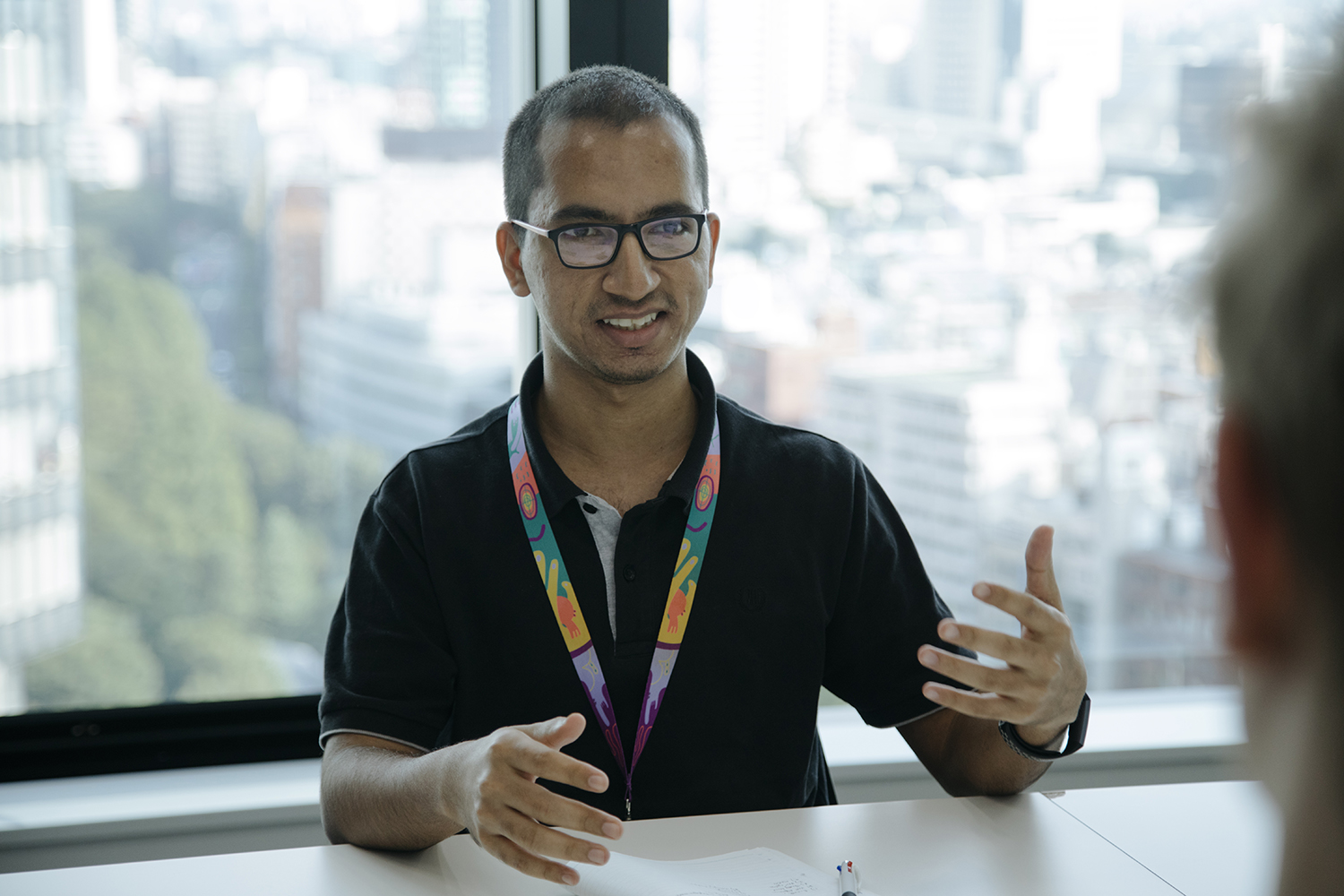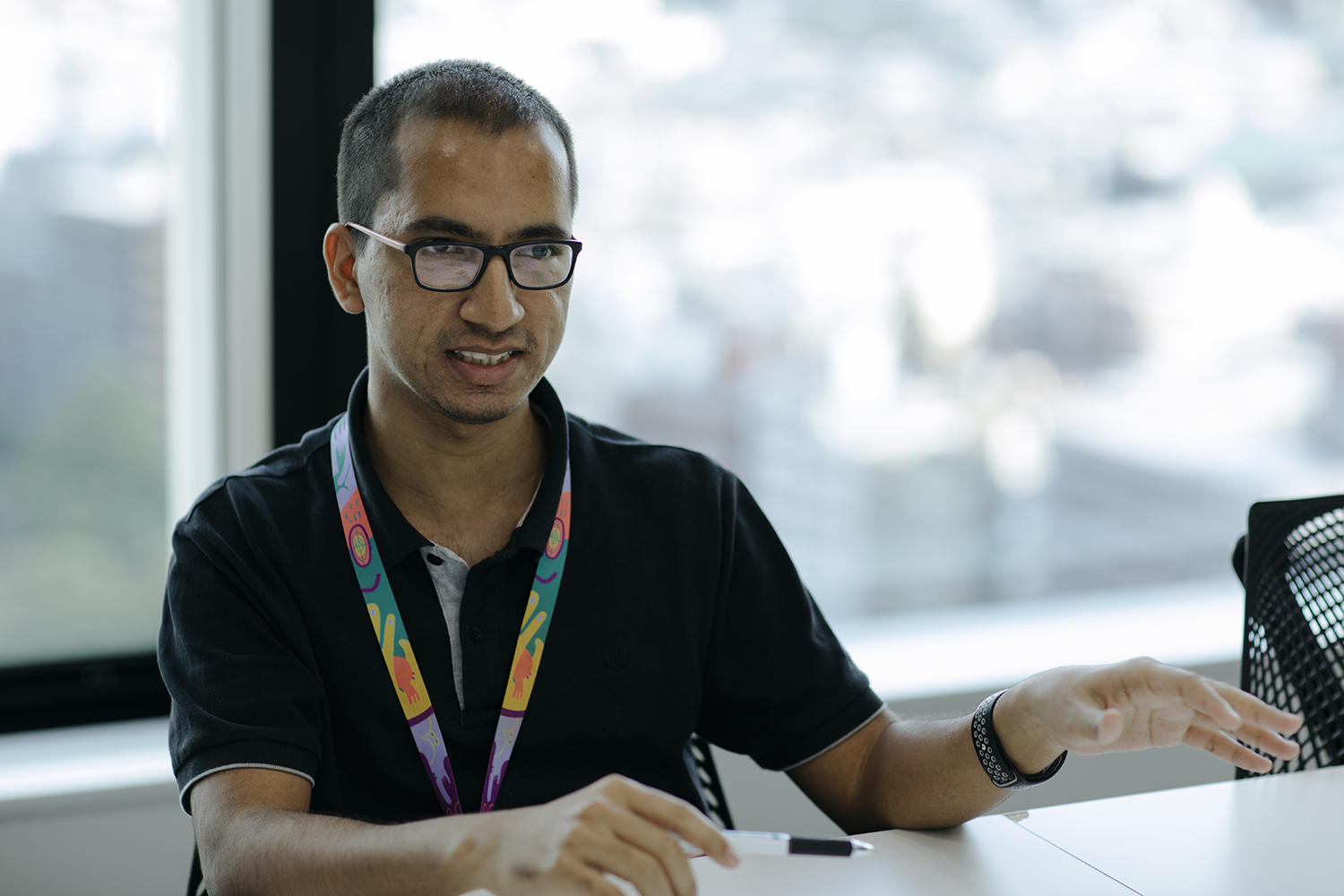Working as a Developer Without Speaking Japanese

by Florian
Is it possible to work in an all-Japanese environment when you’ve only started to learn Japanese? We talked to Mushtaq, a developer who only knew three Japanese phrases before starting to work here.
コンテンツ
Mushtaq’s Profile
Name: Mushtaq (24)
Country: India
Major: Information Science
Industry: IT/Web
Japanese Level: N5
Work status: New graduate (2nd year)
Job hunt: ~5 applications, ~5 interviews, 1 job offer
Florian (F): First, tell me a bit about yourself. Where do you come from, and what did you study in university?
Mushtaq (M): I’m from India, from Bangalore … it’s like the Silicon Valley of India. I did my Bachelor at PES University, one of the prominent ones in Bangalore. My major was Information Science, which is similar to Computer Science, but a bit different. Computer Science involves a lot of hardware, and Information Science is more theoretically based. That was my background before I started working.
F: And what are you doing at work now?
M: Right now, I’m working as a C# developer. I’m using the .NET Framework, so strictly speaking, I’m a .NET developer. I’ve been working as a .NET developer for the past … almost two years now. That’s what I started my work life with.
F: So this is your first job out of university?
M: My first job, in my entire life.
What started it all & the application process
F: What was your incentive for coming to Japan? A lot of people come to Japan because they like anime or are into the culture…
M: So… honestly, I have to tell you: I was never into manga or anime. I only chose to come here because saw this as an opportunity to work abroad. Before this job, I had never worked in my life, and I had never thought about moving to a different country, not even a different state or a different city in India. Working in Japan was totally out of the scope of my wildest imaginations.
So I did the interviews – we had a couple of rounds, about three or four – and when everything was done, I got the mail: “You have been selected.” I was surprised to the core! I couldn’t believe it. The very fact that not everyone gets this opportunity to work in a different country, as a first job out of university, was what motivated me to come to Japan. Before that happened, I had no intention of moving here!
F: So… how did you apply for your job? Was there an event at your university or a company that introduced Japanese companies to you?
M: The company that I’m working at now had contacted my university through an Indian third party. For the first round, they held an aptitude test at our university. Then for the second round and all rounds after that, we had off-campus interviews. For these interviews, we had people from other colleges coming in as well, not just from my own university. So yeah, I found the job through my university.
F: How did you first take notice of that opportunity? Were there flyers or announcements?
M: I first read about it in an e-mail. In India, campus placement is a thing. I don’t know how many other countries have something like that. I think usually you have to go to job fairs, send out lots of applications … but in India, good colleges have companies coming to the college and then select the students right there.
(Not) Learning Japanese
F: This is your first job after university and you hadn’t even thought about working in Japan before. That means you didn’t know Japanese before you came here, right?
M: No, I didn’t know anything!
F: So when did you start learning?
M: I started learning Japanese two days after I saw the mail that informed me that I had been selected. Well, that’s kind of an overstatement because I didn’t actually start “learning” learning. I downloaded a bunch of videos and courses that let me cover the basics before I land in the country. I tried learning, but in the end, I could only manage to remember two or three words, like こんにちは, どうもありがとうございます, and さよなら – and we don’t even use さよなら! (laughs)
So those three words I knew before coming here – and that was it. My actual learning started when I arrived in Japan and started to figure out the reality of the situation. Almost no one in my department speaks English, there’s just one guy, and even he’s not really fluent. In the beginning, it was sometimes hard to communicate.
F: Wait, but the interviews at your university were in English?
M: The thing is, those interviews were held using the third-party company. They were the bridge. There were three people from the Japanese company – one of them spoke English – and an additional moderator that asked specific questions in English. So we could communicate without any problems.
F: Did you end up taking any Japanese classes at all?
M: I attended language classes in Japan, after arriving here. Every week we had a class, about one and a half hours long. I went to those classes for about … ten months, I guess? Almost a year. For the first six months, we did the basics like the two alphabets, culture, easy phrases, and so on. In the second half of the course, we did JLPT N5 level stuff.
F: Ah, but before coming here you thought that for work, English would be sufficient.
M: Yes! I started learning in earnest when I realized how big of a plus it is being able to speak the language. But at first, I didn’t think so much about needing Japanese for work.
F: That’s pretty interesting… a lot of people who want to work in Japan worry about the language requirements, but you just got a job without ever thinking about it! (laughs) But tell me a bit more about your work. You’re a developer now … how much of the things you learned at university have you been able to use at your job?
M: Well, since this was my first job, I was very much looking forward to on-the-job training and what I found was that … even if you don’t have any practical experience, you really get to learn on the job. At my university, we didn’t receive all that much practical education. These days, the overall scheme is different. They changed the subjects, made the curriculum more praxis-oriented and whatnot, but back in my time, the majority of what we learned was theoretical stuff.
So without on-the-job training, working would’ve been pretty challenging. For example, if on the first day they had flat-out asked me to create a website, I would’ve been like “oh, I don’t know… I have to learn…”. But I didn’t feel any pressure. My team knew that I was a fresher and I had no experience, and they were ready to train me on the job. I think you could say that they had no expectations, in a positive sense.
F: Did you also have to learn new things, like new programming languages?
M: In Computer Science, we have concepts like loops, conditions, and all that stuff. The programming language I’m using right now is C#, but I had never used that before. That is irrelevant for a Computer Science developer. Whatever language is given, that’s what we use. It’s just like any other language. If you know the rules and the grammar, you can talk in any language, that’s about the same thing with computer languages as well. So I had learned the skills, as in the theoretical concepts, and I had just to use them.
F: You had never worked with C# before, even for a project in university, for example?
M: Not C#. But I did have my own projects in university. I dabbled with Python for my final year project, for example. It was a website kind of thing.
F: And from there on, it was just about applying what you already knew to another context.
M: Yes, and at work, you have to pay more attention to functionality. There’s more to learn, and you can explore more.
Everyday work
F: So what does your typical day at work look like?
M: There are four people in my team, aside from me. Two people in managerial positions, and three developers. I am the junior developer, and then there are two senior developers working with me.
A routine task for someone like me is a daily standup. Have you heard of agile methodology or scrum? We have a meeting every single day to inform everyone about what happened yesterday and what the plan for today looks like. In the morning, that’s what we start with, and then we proceed with the task. At the end of the day, we have another meeting. There, we check up on what goals for that day were met and what needs more time … we have discussions, clear things up, and so on.
F: You don’t have to go into specifics here if you’re not allowed to, but … what kind of projects are you working on right now?
M: I’m working on an e-marketing system, a sales management system. It’s an in-house product, the intended end users are the employees. It’s for people who are in contact with sales, for example. Using the system, they can input and save the names of clients, billing addresses, order registrations … things like that. Basically, it’s an enterprise edition of WinForms. It’s a .NET application, a very old-school kind of thing, but big companies still use it.
Right now, most of my work is code editing and bug fixing. There are faults in the system at particular points, and the project managers of my team look at them, give me the requirements, and I modify the system and maintain the code for that application. And once I finish – let’s say, I’ve added a button somewhere and I’m done writing the code for that particular button – the next part is testing. I test whether that button is working. After testing is over, the project manager puts it on the real system. Overall, I spend around half of my time coding and the other half doing organizational stuff.
F: You’ve been working in Japan for about two years right now. Are there any projects or tasks you were involved in that were especially interesting to you?
M: Back last year, in August… around that time, we had four other Indian engineers come in. Before that point, another senior engineer and I had both been working on one particular task, back from when we joined all the way until last year. When the new Indians came, we were given a new project and formed a new team. A colleague that had entered the company at the same time as me became the leader, and they made me the sub-leader. We were tasked with working on a project from scratch.
Until that time, we had been taking care of existing projects. Inserting new features, adding and modifying code, deleting code, things like that. But at that particular point, we had to create a new project. It’s an evaluation system for our company. Using the system, we’ll have a round of evaluations every month where each one of us will give out points to their colleagues. Then, the manager will look at the results and say “OK, this person has received positive feedback from everyone, we can increase their salary” or something like that. Just an example.
F: So an internal employee evaluation system.
M: Yeah, just a questionnaire kind of thing. But the project started from scratch. So we had to the sign-in and login features, backend, all that stuff. Creating the whole thing, when it’s very clear how and where it’s going to be used, was very interesting and enlightening. I learned a lot during that phase.
Communicating in an all-Japanese environment
F: At your current company, everyone speaks Japanese and you’re still a beginner. So … how has that been working out for you?
M: It’s been really challenging. Actually, for the first one and a half years, things were fine because there was one person in our office who spoke a little English, and he was our supervisor. So whenever there was anything that we needed to know, we just contacted him. But since this year’s January, they put me on a new project. And there, nobody speaks English … during the first two months, I was like “why is this happening to me?” But then, it kind of hit me. This is the best position to grow, to learn something every single day.
When the lockdown started and we had work from home options, the challenge got bigger. Working from home was nice, but … we could only have meetings online, and all the applications are in Japanese. Before that time, my supervisor had always been nearby, and if he wanted to show me something, he would just press the button and be like “this is the button you have to press.” But because we were working from home, that wasn’t possible anymore.
However, I’m kind of glad that this was the situation I was put in because I started making notes of words every time they said something during meetings … I was quick on my feet and started to learn more Japanese.
F: Now you’re in an environment where you HAVE to learn. It accelerates your learning if you have no other choice but to use that language!
M: Yeah, I mean if I don’t do that, I will be stuck here, for the next five or six years, I guess. And if I don’t have any other plan.
The future & some advice
F: Are there an things that you would like to do in the future for your career? Regardless of it’s in Japan or outside of Japan, just in general.
M: I’ve always been inspired by all these folks – Bill Gates, Steve Jobs, etc. – but that’s too far fetched. So the small goal that I want to reach is to provide opportunities for other people, become an employer, and pay others for their livelihood. That would be ideal for both my country and the people because then I’m providing jobs. I don’t have concrete plans yet, but if I have an idea or I just want to get adventurous, I would like to do that in the future.
F: Is there advice you’d like to give to people who are thinking about working in Japan?
M: What I’ve observed is that when they recruit fresh university graduates, Japanese companies don’t automatically select the people with the highest skills. They also put a great emphasis on motivation and your will to improve. That’s almost their number one criteria. In India, people struggle to get all these technical skills, and they try to get the best positions at companies by relying on them. But for Japanese companies, both your skills and your personality are important. I think that’s important to keep in mind.
Any questions?
Interested in working as a programmer or developer in Japan and still have questions? Ask away in the comments! We’ll check back with Mushtaq and give you some advice about how to prepare and find a job.
You want to work in Japan?
Find out how others got their jobs!
■ Everyday work as a designer, Tanya from Ukraine
■ Finding time to study and tough interview questions, Kevin from the Philippines
■ Online Application and Apparel, Clemence from France
■ More job-hunting advice from your Senpai
Recommended Posts

How to Get Along with Your Japanese Boss
25 5月 2021 - Work, Working Culture

The 10 Most Popular Japanese Companies in 2021
19 5月 2021 - Work








